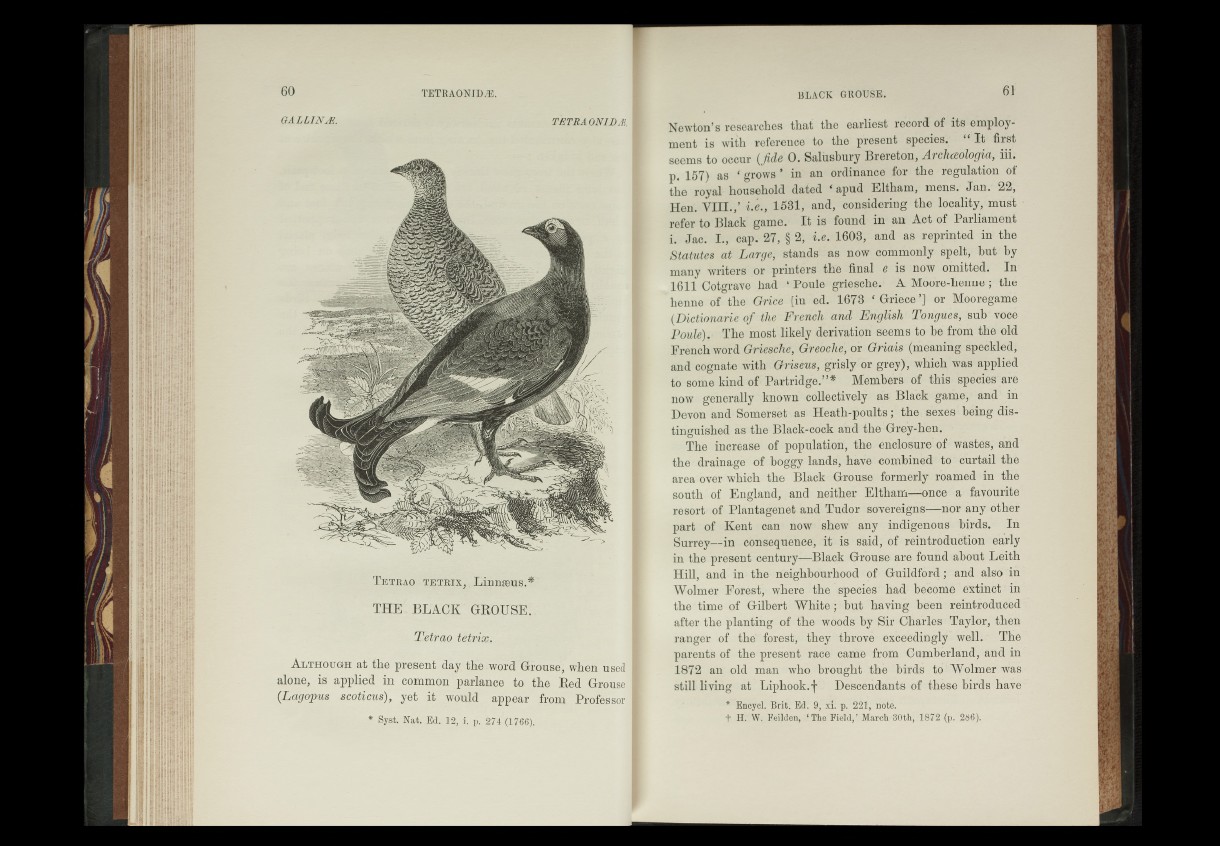
QALLÏNÆ. TETRAONIDÆ. Newton’s researches that the earliest record of its employment
Tjetrao,» tetrix, , Eihnaaus.*
THE.. BL'ACK GROUSE.-
T'etrao tetrix...'
Although at'the present'day the-woiJ&Greu'sef when fisej
alone, is applied in comment parlance to the Red feonsj
(Lagopus scotic%s), yet_ it would appear from Professor
* SyaK Nat. Ed.v12^ j,Kp. $71‘(il-766)..
is with reference to the present species.; “'Hr first
seems to occur (Jide Q, Salüsbury Brereton, Archablogia, iii.
p. 157) as * grows ’ in an ordinance for the regulation of
the r o y a l household dated ‘apud Eltham, mens. J a n / 22,
Hen. m , ’ i.e., 1581, and, considering the locality, must
refer to Black game. It is found in an Act of Parliament
i. Jac. I., cap. 27, § 2, i.e.-1608, and as reprinted in the
Statutes at Large, stands as now commonly- Spelt/'bute'by
many writers or printers the final e is now’ omitted; In'
1611 Cotgrave had ‘ Poule griesche.’ -A Moore-henne; the
henne of the Grice [in ed. 1678 « Griece ’] or Mooregame-
(Dictionarie of the French. ahdr English' Tongues, sub' voce
Poule).< The most likely derivation seems to'be from the eld
French word Griesche, Greoehe, or Griais'(meaning- speckled;
and cognate with Gnsèus, grisly'or grey)/ which was applied
to some kind oh Partridge.’’* Members of this■ species1 are
now generally known collectively as Black game, and' in
Devon and^Sotoset as Heath-poults P'tke, sexesr being distinguished
as the Black-cock and the- Grey-hen'. !
The increase of population, the enclosure’of wastes', and’
the drainage of boggy lands, have combined " 'to'' curtail thé
area óver which the Black Grouse formerly roamed in the
south of England, , and neither Eltham—once^a favourite"
resort of Plantagenet and Tudor jsovereigns»—nor1 any other
part of Kent can now shew any indigenous birds. In
Surrey—in consequence,-it-is said, of reintr-eduction-early
in the present century—Black Urrouse-are found -about Léith
Ball, and in the neighbourhood of Guildford; and also' in
Wohner Forest/ where the species' had1 become extinct!-in
the time of Gilbert White-phut having "been reintroduced
after the planting of the woods byêSitó Charles Taylor, then
ranger of th é 'forest, they throve exceedingly well;- The
parents of the present race cariTe from Cumberland, and-in
1872 an old man who brought the birds to 1 Woimer was
still living at Liphook.f Descendants of-these birds "have
* Encycl. Brit. Ed. 9; 31; p.
T H.’ W. Feilden, Th.e Field,’ March -30th, .1-802 ( $ . ' .r'